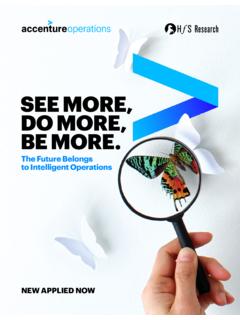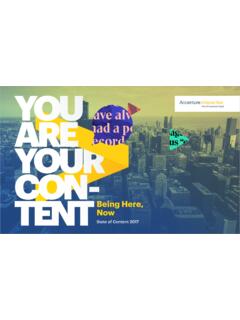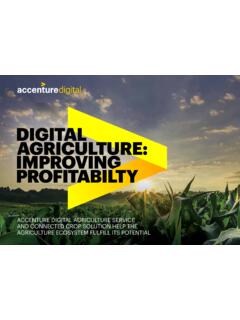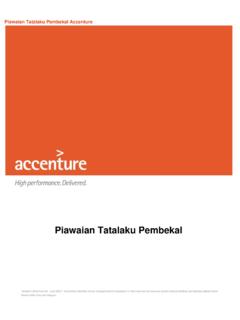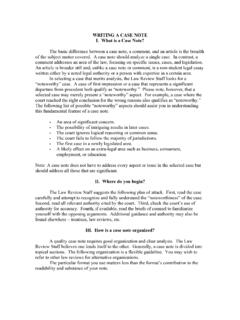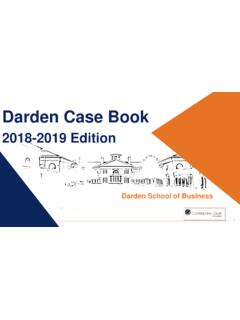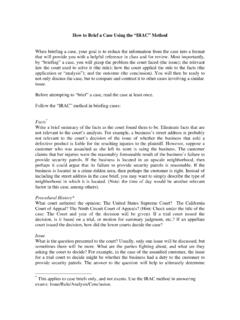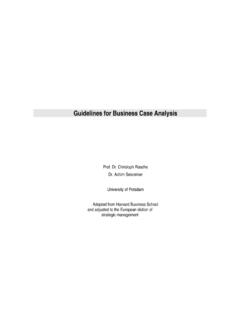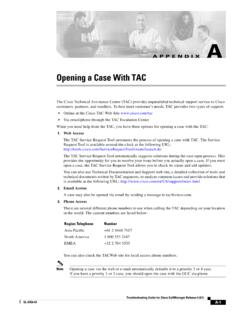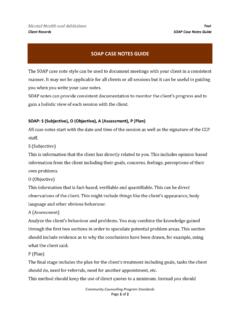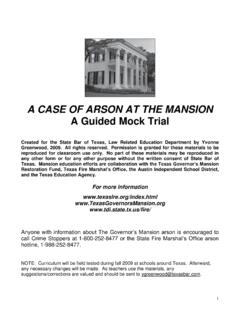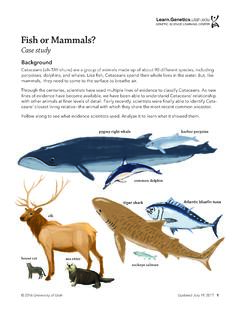Transcription of Case Interview Workbook - Accenture
1 case InterviewWorkbookWhat is a CaseInterview?Common Misconceptions About CaseInterviews case Interview SuccessFactorsThe case Interview Process: Structured Problem Solving Clarify theProblemDecompose theProblemState Hypotheses andDevelop TestHypothesesSummarize and CommunicateFindings Types ofCases The GreatUnknown The Parade ofFacts The Back of theEnvelope Samples Frameworks andApplication Putting itTogether2 case InterviewWorkbook34567891011131416182021 TABLEOF CONTENTS3 case InterviewWorkbookA case Interview is a type of job Interview , used most frequently by consulting firms, that allowsanapplicant to demonstrate his/herability to solve a given business a case Interview , an interviewer presents a situation or case and then asks the applicant to explore the underlying causes of the problem and suggest recommendations to remedy cases given tend to be realbusiness situations, often drawn from the interviewer s actual project interviews typically last from45to 60 minutes, with a focus on thecase itself lasting 30 to success in a case Interview will not depend on identifying the correct answer.
2 But rather on how clearly you define the problem, how logicallyyou structure your analysis, your quantitative analysis skills and howwell you communicate your firms are looking for people who can show problem solving and business analysis skills, think under pressure and maintain a professional presence with their teams and the case Interview provides excellent insight into how well youwould perform in a purpose of this guide is to help familiarize you with the process of a case Interview , introduce you tosome potential methodologies, and provide you with sample cases to about case interviews is also a helpful way to determine ifstrategicconsulting is right for you, as thesecases reflect the types of business situations and structured thinking consultants encounter on a A case Interview ?THERE ARE MANY MISCONCEPTIONS ABOUT THE case Interview AND WHAT THE INTERVIEWER IS LOOKING is one right answerorapproach to thecaseThe interviewer expects youtoget the rightanswerIndustryknowledge is required to do well on thecaseFactUsually there are severalcredibleapproaches andsolutionsThe interviewer expectsathoughtful, structuredresponseThe interviewer expects you to be effective with the knowledge youhave and make hypotheses based on sound commonsenseCOMMONMISCONCEPTIONS ABOUT CASEINTERVIEWS4 case InterviewWorkbook5 case InterviewWorkbookCASEINTERVIEW SUCCESSFACTORS Understand the case situationand what is beingasked analyze the case issues andpotential solutions in a structuredmanner Make certain your thoughtprocesses are transparent to the interviewer Be creative.
3 Yet practical use your business judgment and givespecifics Takenotes Make sure you arecommunicating clear andlogically Listen for suggestions and hintsfrom theinterviewer Engage the interviewer it is okayto ask for direction andclarification Manage time effectively maintain your momentum, don t getbogged down on onepoint Identify critical focus areas andask probing questions to learnmoreCASE Interview SUCCESS DEPENDS ON PROVIDING A THOUGHTFUL AND STRUCTURED RESPONSE TO THE case study Interview is quite similarto a consulting , you will be given a description of a case problem by the interviewer. This description may be as short as one sentence or as long as a page of detailed information. Oncegiven the case description, you willneed to understand the problem by askingthe interviewer well thought out answers to these questions should allow you to align on theobjectivesandexpectationsbeforedevelo pinganapproach(framework) ,youshoulddiscusstheanalysesyouwouldperf ormtodeterminepotentialsolutionstothebus iness interviewer may ask you to perform simple analyses to test your , you should summarize your methodology with anyrecommendations you may have as well CASEINTERVIEWPROCESS.
4 STRUCTURED PROBLEMSOLVINGLISTEN TOCASECLARIFY PROBLEMDECOMPOSE PROBLEMSTATE HYPOTHESESTEST HYPOTHESESSUMMARIZE FINDINGS6 case InterviewWorkbookIn consulting, understanding the client situation is fundamental to developing solutions to important problems as well as recommendations for how a business could be run more case Interview models this by presentingyou with information, asking you to make sense of it, and developpotential the natureofthe business issue (e g , declining profitability, loss of market share, or new competitive threats) is an on your questions, theinterviewer will often provide you with more details about the structuring your questions, you will cue the interviewer to how you plan to work through the is important to beflexiblein your approach and open to multiple solutions If the questions you are asking do not yield useful answers, try switching to an alternate , you are also being evaluated on your ability to ask PROBLEMLISTEN TOCASECLARIFY PROBLEMDECOMPOSE PROBLEMSTATE HYPOTHESESTEST HYPOTHESESSUMMARIZE FINDINGSGoal: Articulate Key CaseProblem7 case InterviewWorkbookAskclarifying questionsActivities.
5 ProbeforadditionalAssess informationcasefactsSummarizeissuesConfi rmobjectivesDocument and fordiscussionandexpectationsconfirmassum ptionsPause tostructure yourthinkingOnce you have stated and clarified the problem, you need todecompose it in an exhaustive, using an issue tree, you can break the problem into smaller pieces and illustrate logical relationships among the issue trees arestructured asfollows:To develop a good issue tree, you should ensure that thesubcomponents are linked in a logical manner,thatit prioritizes the issues, and that it reveals possible , each branch of the tree must not overlap with another (mutually exclusive), and the branches should thoroughly represent contributing elements (collectively exhaustive).DECOMPOSETHE PROBLEMLISTEN TOCASECLARIFY PROBLEMDECOMPOSE PROBLEMSTATE HYPOTHESESTEST HYPOTHESESSUMMARIZE FINDINGSGoal: Identify Root Causes ofProblemActivities:Break the problem into its component parts in a structuredmannerProblem( declining profitability)Issues/Causes( )Issues/Causes ( costss).
6 8 case InterviewWorkbookOnce you are confident you understand the problem, you should list out potential hypotheses that may resolve the core will then need to choose a framework (or analysis tool)to structure your hypotheses (see Sample Frameworks and Applications section), but do not feel constrained by thesesince many cases will not fit neatly into one of those is a key to structured thinking it allows you to approach a problem in a holistic manner, while directing your analysisto each of the componentswithin ANDDEVELOPLISTEN TOCASECLARIFY PROBLEMDECOMPOSE PROBLEMSTATE HYPOTHESESTEST HYPOTHESESSUMMARIZE FINDINGSGoal: State Hypotheses/Potential Solutions9 case InterviewWorkbookReviewproblem decompositionActivities:Identify potential hypotheses/solutionsState your assumptionsChoose appropriate framework to testhypotheses(See Sample Frameworks and Applications section) for example: Porter s Five Forces, 4 P s of Marketing, Profitability Analysis, Three C s Once a framework is selected, you must analyze each component of the framework in a logical manner.
7 Discuss the analyses you would perform to determine if your initial hypothesesare may have to ask additional questions of the interviewer to get the information needed to times, you may beasked to perform an analysis with simple data supplied by you find that your analyses are not confirming your initial hypotheses, develop new ones If your analyses do not appear to be enlightening,the interviewer may direct youtowardsanother advantage ofthese hints if they are TOCASECLARIFY PROBLEMDECOMPOSE PROBLEMSTATE HYPOTHESESTEST HYPOTHESESSUMMARIZE FINDINGSGoal: Apply framework to TestHypotheses10 case InterviewWorkbookDescribe analysesto beappliedActivities: Break problem intoits component parts inastructuredmannerApply framework and discussfindings/implications to solutiondefinitionFinally, summarize the framework and analyses you utilized in the case and communicate effectively those recommendations for the client and potential nextstepsthe client should interviewer may tell you what happened with the real project situation on which the case was , don t worry if your methodology or answer did not match the real project situation because you are being evaluated on your thought processes and not against some predetermined FINDINGSLISTEN TOCASECLARIFY PROBLEMDECOMPOSE PROBLEMSTATE HYPOTHESESTEST HYPOTHESESSUMMARIZE FINDINGSGoal: SummarizeFindings/Implications11 case InterviewWorkbookSuccinctly remind interviewer of issuescoveredActivities: Present solutionsPresentalternative scenariosPoise Are you confident in your answer?
8 How do you handle yourself whenyou make a mistake? Do you perform well underpressure?12 case InterviewWorkbookCommunication Are you articulate incommunicating your thought processes and conclusions withothers? To be a successful consultant,youmustbeabletoclearlycommuni cateyourrecommendationsandarticulatehowy ouwereabletoarriveatyour conclusions Listening skills: are you leveraging all the information/data providedby theinterviewerFlexibility As situations change and new information becomes available, are you able to adapt your thinking tonew data or an emergingenvironment?OtherIntangibles Do you display energy anddrive? Do you show initiative? Do you manage timeeffectively? Do you demonstratedecisiveness? Do you convey a genuine interestin the career and thefirm? SOFTEVALUATIVE CRITERIAIn addition to your ability to ask probing questions,decompose the problem, define the preferred analysis framework and perform the analyses in the case , you will also beevaluatedon many intangible interviewers look at these criteria in non- case interviews as well, you will need to beextra-conscious of them in a case Interview , since often times your concentration will be on solving Great Unknown and Back of the Envelope cases are the most common types of , regardless of the type.
9 Be sure you have a solid understanding of the facts and what is being asked of you before you begin to crack GreatUnknown Provides verylittle informationTests candidate sability to probe for additional detailsRequiresstructuringframeworkbased onnewfactsThe Parade ofFacts Provides asignificant amount of detail someunnecessaryTests candidate sability to distill keyissuesRequires depth ofanalysis based on relevantfactsThe Back of theEnvelope Provides littleinformation, but asks a keyquestionTests acandidate s analyticabilitiesRequires logicalthought process and ease with numbersTYPESOF CASESTHERE ARE THREEGENERAL TYPES OFCASES:13 case InterviewWorkbook14 case InterviewWorkbookOne of the most common types of case interviews poses the situation in one or two sentences, leaving you with little information or structure on which cases are used often because they test your ability to discover necessary facts by posing the rightquestionsand being able to developanalytical frameworks to solve Methodology:CaseDescriptionListen carefully and determine the central business problem DecompositionIdentify and prioritize root causes of the problem by breaking theproblemdown into its component issue tree is a valuable tool to ensure that decomposition is exhaustive and thatthe sub-components are linked together in a UnderstandingConsider the central problem What additional facts do you need to fully clarify this problem?
10 What are the crucial pieces of information that willallow you todevelopaframeworkaroundthisproblem?Wri te those questions out and ask the prepared to go several layers deeper into the issue as the interviewer sanswersmayleadyouto andFramework DevelopmentDescribe to the interviewer what some of the potential issues/hypothesescould choose a framework that willstructure your thinking and guide you through testing TestingUsing the framework selected, explore the issues/hypotheses initially laid the factors in each section of the framework that are relevant to the central list out analyses to asking additional questions, you may still yield more information about the case from your initial issues/hypotheses in light of your structured analyses and suggest possible recommendationsfor GREATUNKNOWN Interview Example: The client, a leading manufacturer of prefabricated kitchen furnishings, has been steadily losing market shareover the last InterviewWorkbook The senior executive team would like you to help them understand whyand what they can do to improve their market Methodology:Problem Understanding Has the size of the market changedin the last twoyears?
